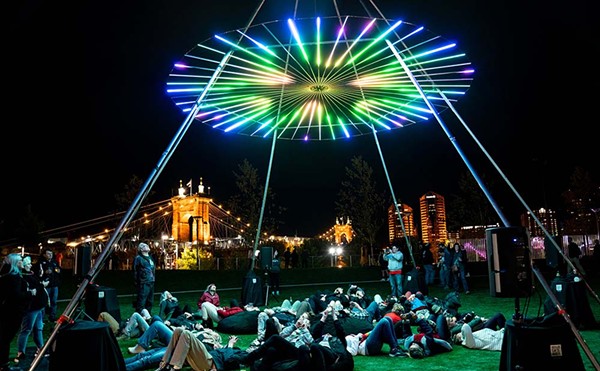Unless you’ve locked yourself away in a bunker 30 feet underground or haven’t listened to NPR in more than a decade, we’re all aware that humans are destroying the planet.
We know the emissions from our SUVs will eventually suffocate us. We know the same soil that sprouts our vegetables is polluted by pesticides and countless other contaminants. We know the plumes of smoke billowing from our factories will eventually create enough greenhouse gasses to turn the whole planet into a microwave, melt the polar ice caps in Antarctica and turn our backyards into a scene out of Waterworld.
But we also know that we’re capable of changing this by making both big and small adjustments to our daily lives.
Allie Yoko, a fifth-year graphic design student in the University of Cincinnati’s Design, Art, Architecture and Planning (DAAP) program, recognizes the importance of making these adjustments and has reacted by launching Black Orchid Fashion, a Web-based eco-fashion company that offers a line of women’s clothing made from sustainable bamboo fibers.
“Over the past years, I’ve become very interested in living a more environmentally friendly lifestyle and I’m seeing both the little and big things people can do to achieve that,” Yoko says. “Since clothing is something that people will always be buying, I thought that if people had an option that is better for the earth, we should take advantage of that.”
Yoko began conducting research and designing the Black Orchid Fashion brand in June 2008, when she learned that bamboo is one of the earth’s most sustainable natural fibers.
She says that bamboo fiber is 100 percent biodegradable, and its decomposition process does not cause any environmental pollution, unlike other fibers like cotton that are commonly treated with pesticides.
“Bamboo has a natural antibacterial component, so no chemicals are needed to be added to the fabric to make it antibacterial like many fabrics do,” she says.
In addition to being biodegradable, bamboo serves as a cleanser for the environment. Yoko reports that it absorbs five times the volume of greenhouse gasses as an average stand of timber trees and releases 35 percent more oxygen. Its roots retain water in the watershed, which helps sustain riverbanks and reduce water pollution.
Bamboo also doesn’t need to be replanted and can grow almost anywhere, making it just as likely to be found in Clifton or any other urban setting as in the gardens of East Asia.
The Black Orchid Fashion Web site, first launched in January 2009 and relaunched March 1 with a new interface, offers swimsuits, dresses, tops, bottoms, hoodies and leggings, all made in the U.S. from imported bamboo fiber.
“We don’t use sweat shops or child labor,” Yoko says. “We use quality fabric and have a high quality product that is not made with any pesticides, so the product is worth the cost.”
Cost can be a major factor limiting consumers’ ability to tailor their lifestyles to be more environmentally friendly, but there’s a reason why the price differs between the organic apples at the grocery store and the non-organic apples right next to them.
“There is a certain level of care that inherently goes into organic products, and I’ve found that the quality of the clothing is reflective of that care,” says Sarah Dunn, a model for Black Orchid Fashion and fifthyear graphic design student at DAAP. “I feel good about those products, too. Clothing is clearly necessary, but there really is no need for its purchase to be a cost to the environment.”
Yoko managed to get Black Orchid Fashion off the ground with the help of her father, Gary Yoko, an architecture graduate from DAAP who said he has acted as a “business consultant” to his daughter.
“I’m trying to pass along my many years of experience working with various national brands to develop their brand standards,” he said. “Our goal from the beginning has been to establish Black Orchid Fashion as a unique clothing brand that is focused on protecting the environment and educating our customers on how they can do their part.”
Keeping this goal in mind, the father-daughter duo took on the labors of setting their first business endeavor in motion.
“It took a lot of research to find the manufacturers and distributors — a lot of research followed by phone calls, e-mails, trial and error,” Allie says. “Luckily, I have my father to help me make sure the companies are liable.”
The Yokos not only give people the opportunity to clothe themselves in an environmentally sound way, but they also give aspiring fashion design students the opportunity to contribute to their environmental cause while gaining work experience. They’re currently holding a student eco-fashion design contest to expand the Black Orchid Fashion product line with a $500 award for the winner.
“Hopefully, this will inspire young designers to learn about the benefits of using sustainable fabrics in their designs,” Gary says.
They also donate a portion of all Black Orchid Fashion proceeds to Conservation International, a charity that works to conserve biodiversity and ensure sustainable livelihoods, something that both Allie and Gary strongly support.
“I don’t think it is something that shouldn’t be trendy,” Allie says. “I think it should be a way of life.”
For more information on BLACK ORCHID and eco-fashion or to order clothing, visit www.blackorchidfashion.com.
More Female Design Entrepreneurs from UC
Because this section is about women who make things and because DAAP is just brimming with talented and crafty women, here’s a glimpse at two who have established their own independent design lines and were instrumental in conceiving and producing the recent craft circus/arts market, GRASS, last month at the Niehoff Studios on Short Vine. This communityinspired event featured clothing, jewelry, art, music and more with vendors from Cincinnati and elsewhere — like a big city trunk show, but here.
Poncho Rose: Brittany (Rosie) Kovacs
Brittany Kovacs is the mastermind behind Poncho Rose, a clothing line that has built its reputation on authenticity, originality and process. Items have unexpected, almost avant garde details and interesting combinations of texture and color. She’ll hand embroider a vest with patterns inspired by the Ndebele people of Zimbabwe, bleach out a pair of black denim shorts and outline the state of Ohio on the back pocket or add nontraditional seaming to the side of a skirt. For fabric expect rustic feeling denim and cotton alongside flashes of futuristic mesh and satin. Currently dying a garment with mouthwash and chamomile leaves, Kovacs says it’s this mix of the natural and the experimental that “attracts a certain kind of person, a person with a little umph” to Poncho Rose.
Grabbing inspiration from vintage finds and up-cycled garments, Kovacs could be called a resourceful clothier. She believes clothing reflects changes in society and comments on the social and ecological events of the time, which is why craftsmanship is so important to her. She plans to open a concept store in the old Cincinnati Brush Factory in Brighton after she graduates in June to feature locally made merchandise, including her line, which will be constructed on the premises so clients and customers can see where and how their items are being created.
“I just want to be able to sustain myself and help others do the same through handcrafted work and good quality artisanship. I think there is a movement happening, slow, but it’s there. Consumers are looking for quality pieces, whether that’s clothes, furniture, food, etc. Something that has a little more meaning and will last. An Arts and Crafts revival!”
VEIN: Lynda C. Lucas
Lynda C. Lucas’ nature and voodoo-inspired talismans are wearable pieces of narrative history with a sarcastic slant. Finding inspiration in native culture and black magic, she combines organic materials like porcupine quills, penis bones and animal skulls with functional and scientific objects like medicine bottles, glass vials and bullet casings to form sculptural necklaces that are both delicate and obtuse.
After collecting her baubles (what other people might consider garbage) from places like cruelty-free salvaged science stores, Victorian curiosity shops or the ground, she’ll lay them out and begin spontaneously composing a new necklace. As she’s had no formal training in jewelry making (she’s a Graphic Design major at DAAP), she approaches VEIN in an unconventional way that is truly DIY.
VEIN itself refers to “a vein pattern in your body, in a tree, in lightning and in a river,” but also the word “vain,” reflecting the normally meaningless nature of jewelry. But Lucas takes the time to ensure that her pieces are anything but meaningless. Believing that stories and history imbue all objects with significance and power, she learns the history behind the items she puts on her necklaces, even going so far as to handwrite tiny tags detailing the origin of each component.
This cycle of discovery, knowledge, creation and letting go is something Lucas does on repeat giving women (and men) a tangible chunk of unexpected beauty.
For more information contact [email protected] or [email protected].





